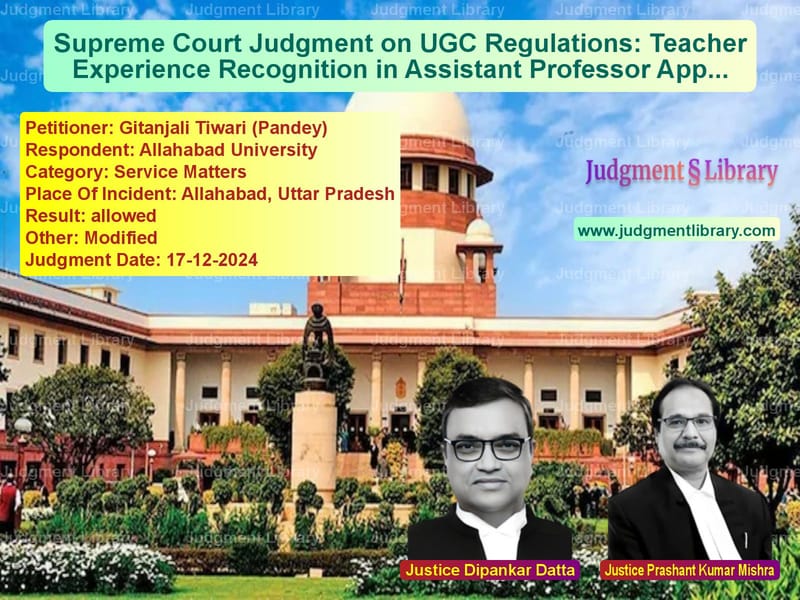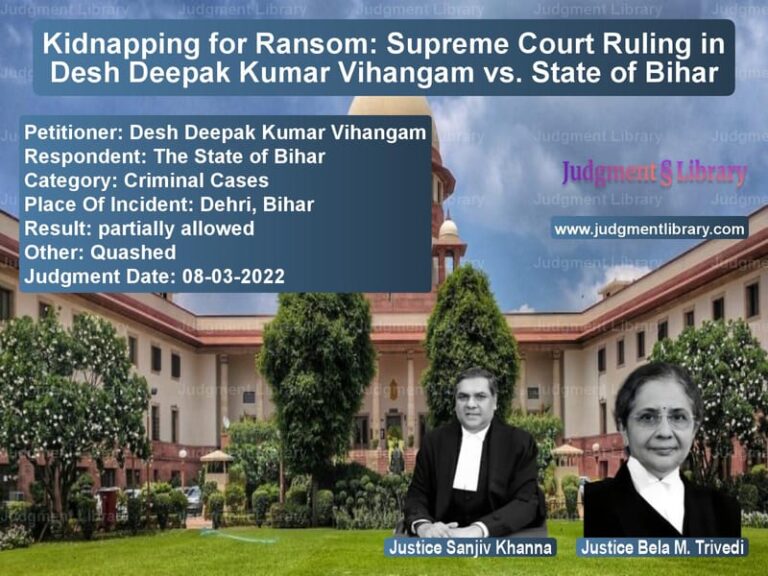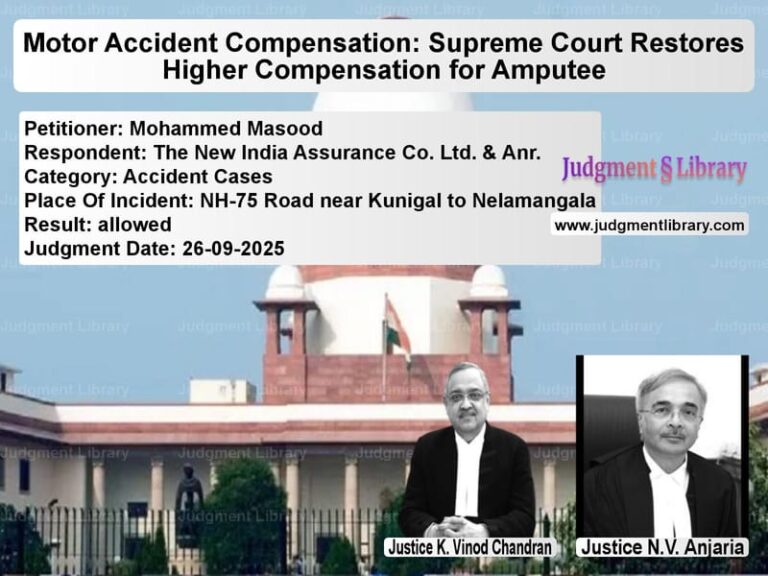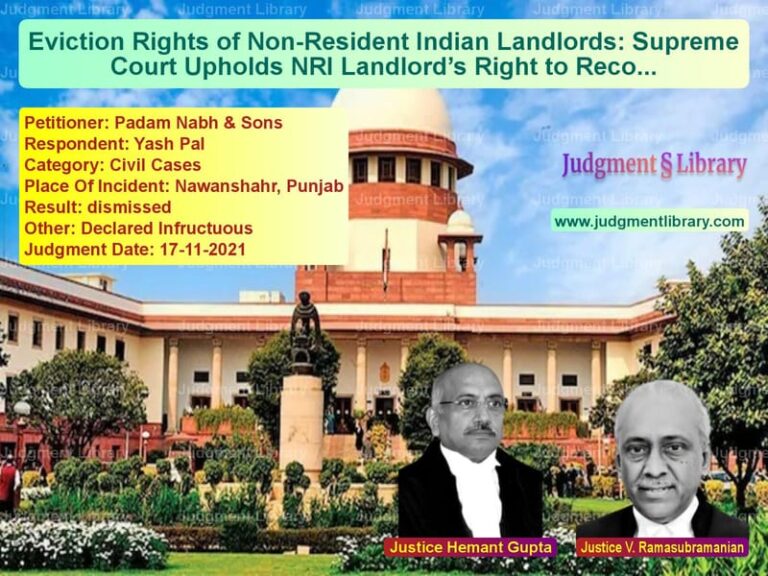Supreme Court Judgment on UGC Regulations: Teacher Experience Recognition in Assistant Professor Appointments
The Supreme Court of India, in its judgment delivered on December 18, 2024, addressed critical issues related to the eligibility criteria for the post of Assistant Professor in various universities and colleges across India. The case, involving Gitanjali Tiwari (Pandey) against Allahabad University, dealt primarily with the interpretation of regulations set by the University Grants Commission (UGC) regarding the recognition of past teaching experience for shortlisting candidates for interviews. The judgment clarifies key aspects of teacher recruitment processes and the validity of UGC guidelines.
Background of the Case
Respondent 1, Gitanjali Tiwari (Pandey), had applied for the post of Assistant Professor in Sanskrit at Allahabad University after the university published advertisements for multiple teaching posts. Despite fulfilling the educational qualifications and having a solid teaching background, including serving as a guest lecturer and on a contractual basis in various institutions, she was not shortlisted for an interview. The reason provided by the university was that her previous teaching experience did not meet the eligibility criteria for the post as outlined in the 2018 UGC Regulations.
The university’s stance was based on Regulation 10(f)(iii) of the UGC 2018 guidelines, which stipulated that past teaching experience would only be counted if the incumbent was drawing a salary equivalent to that of a regularly appointed Assistant Professor. This led to Gitanjali’s exclusion from the selection process as she had not been paid a salary equal to the one prescribed for regular faculty members.
After her petition was dismissed by the Single Judge of the Allahabad High Court, Gitanjali filed an appeal challenging Regulation 10(f)(iii), which she claimed was arbitrary and unconstitutional. The Division Bench of the High Court also rejected her appeal, prompting her to approach the Supreme Court.
Legal Issues Raised
- Whether Regulation 10(f)(iii) of the 2018 UGC Regulations, which excludes past teaching experience unless it meets specific salary criteria, violates Article 14 of the Indian Constitution by discriminating against candidates based on their salary history.
- Whether past teaching experience, even if on a contractual basis or as a guest lecturer, should be counted for shortlisting candidates for the post of Assistant Professor in light of the overarching goals of UGC regulations.
- Whether the Division Bench of the High Court was correct in reading down Regulation 10(f)(iii) to exclude its applicability to Assistant Professor posts.
Arguments Presented
Arguments by the Petitioners (Gitanjali Tiwari)
- The petitioners argued that excluding teaching experience unless it meets the salary condition is discriminatory and violates the principles of equality under Article 14 of the Constitution.
- They contended that the salary criterion for counting past experience as valid teaching experience undermines the qualifications of teachers who have served in non-regular capacities but have extensive teaching experience.
- The petitioners also argued that the High Court had wrongly interpreted Regulation 10(f)(iii), leading to an unfair exclusion of experienced candidates like Gitanjali Tiwari from the selection process.
Arguments by the Respondents (Allahabad University)
- The respondents defended the salary condition set in Regulation 10(f)(iii), arguing that it was necessary to maintain high standards for faculty appointments.
- They further argued that the UGC regulations allow universities to determine their criteria for shortlisting candidates, and the inclusion of salary as a requirement was not arbitrary but aimed at ensuring the quality and consistency of academic standards.
- The respondents claimed that the decision to exclude non-regular teaching experience was in line with the regulations and necessary to ensure fair and consistent recruitment practices across institutions.
Supreme Court’s Observations
On the Violation of Constitutional Principles
The Supreme Court examined whether the regulation’s exclusion of non-regular teaching experience was in violation of Article 14 of the Indian Constitution, which guarantees equality before the law. The Court observed:
“Excluding candidates based on the salary they received in previous teaching roles creates an artificial barrier that discriminates against equally qualified and experienced individuals. The regulation does not take into account the context in which many teachers work, especially in private or underfunded institutions where they may not receive the prescribed salary for regular posts.”
On the Interpretation of UGC Regulations
The Court further addressed the interpretation of UGC Regulation 10(f)(iii), which restricts the counting of past services unless the incumbent had been paid a salary equivalent to a regular faculty member. The Court stated:
“While it is important to maintain the standards set by the UGC, we find that the regulation’s application to exclude teaching experience based solely on salary is unnecessarily restrictive and fails to account for the diverse nature of the academic workforce. This interpretation of Regulation 10(f)(iii) is not consistent with the overarching goal of promoting qualified and capable educators in India’s universities.”
On the High Court’s Approach to Reading Down the Regulation
The Court observed that the High Court had read down Regulation 10(f)(iii) by limiting its applicability only to the posts of Associate Professor and Professor, and excluding it from the criteria for Assistant Professor appointments. The Court stated:
“The High Court’s approach to read down Regulation 10(f)(iii) is not in accordance with established principles of statutory interpretation. Courts cannot add or delete words from statutes or regulations unless it is absolutely necessary to give effect to legislative intent. The High Court’s decision to exclude Assistant Professor posts from the scope of the regulation was a judicial overreach.”
Final Verdict
- The Supreme Court overturned the High Court’s reading down of Regulation 10(f)(iii) and ruled that past teaching experience should be counted for shortlisting candidates for Assistant Professor posts, regardless of salary received.
- The Court also directed Allahabad University to reconsider the petitioners’ eligibility for shortlisting in light of the corrected interpretation of UGC regulations.
- The Court emphasized that the recruitment process for Assistant Professors should be transparent and inclusive, ensuring that candidates with valid and relevant teaching experience are not unfairly excluded based on technicalities like salary discrepancies.
Implications of the Judgment
- Equality in Teacher Recruitment: The judgment ensures that all teachers, regardless of their previous pay scale or employment type, are given equal opportunity to be considered for faculty positions based on their teaching experience.
- Clarity on UGC Regulations: The Court’s decision clarifies the interpretation of UGC regulations regarding the counting of teaching experience, providing guidance to universities across India in their recruitment processes.
- Precedent for Future Cases: This case sets a precedent for similar challenges to restrictive criteria in recruitment processes for academic positions, ensuring fairness and equal opportunity in the selection of candidates.
- Addressing Discrimination: The judgment addresses the potential discrimination faced by teachers on temporary or guest faculty contracts, ensuring that they are not disadvantaged in the recruitment process for permanent positions.
The ruling reaffirms the importance of inclusivity in the recruitment of faculty members and the need for university recruitment processes to be both fair and transparent, considering the full range of qualifications and experience that candidates bring to the table.
Petitioner Name: Gitanjali Tiwari (Pandey).Respondent Name: Allahabad University.Judgment By: Justice Dipankar Datta, Justice Prashant Kumar Mishra.Place Of Incident: Allahabad, Uttar Pradesh.Judgment Date: 17-12-2024.
Don’t miss out on the full details! Download the complete judgment in PDF format below and gain valuable insights instantly!
Download Judgment: gitanjali-tiwari-(pa-vs-allahabad-university-supreme-court-of-india-judgment-dated-17-12-2024.pdf
Directly Download Judgment: Directly download this Judgment
See all petitions in Employment Disputes
See all petitions in Public Sector Employees
See all petitions in Workplace Harassment
See all petitions in Judgment by Dipankar Datta
See all petitions in Judgment by Prashant Kumar Mishra
See all petitions in allowed
See all petitions in Modified
See all petitions in supreme court of India judgments December 2024
See all petitions in 2024 judgments
See all posts in Service Matters Category
See all allowed petitions in Service Matters Category
See all Dismissed petitions in Service Matters Category
See all partially allowed petitions in Service Matters Category







